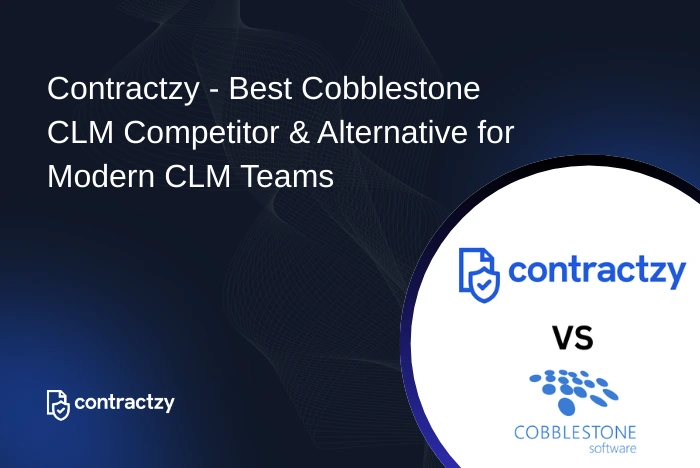
Post-Execution Contract Management: what is it and why should you care?
Have you ever thought that signing a contract marks the end of a business deal? Think again. In reality, it's just the beginning of a crucial journey. This crucial journey is post-execution contract management, the process of overseeing a contract after it is been signed to ensure all parties fulfill their obligations and reap the intended benefits. In fact, effective post-execution management can be the difference between a successful, long-term partnership and a costly legal battle.
So, what exactly is Post-Execution Contract Management?
After a contract is signed, it might be tempting to consider the process complete. However, this mindset overlooks the critical activities required to ensure the contract's success. Post-execution contract management is the crucial stage of the contract lifecycle that takes place after a contract is signed. It encompasses all the activities required to ensure both parties fulfil their obligations, maximize the value of the agreement and mitigate potential risks. This includes tracking deadlines, managing changes to the contract, overseeing performance and ensuring adherence to relevant regulations.

Key Activities in Post-Execution Contract Management:
- Contract Administration
- Compliance Management
- Risk Management
- Financial Management
- Relationship Management
- Renewal and Termination
Contract Administration
Contract administration is essential for ensuring all parties meet their contractual obligations. This involves:
- Tracking Deliverables and Milestones: Keeping a close eye on key deadlines and milestones to ensure everything is delivered on time. For example, missing a milestone in a construction contract could lead to significant financial penalties.
- Performance Measurement: Regularly evaluating how well all parties are performing against the agreed-upon terms and conditions.
- Amendments and Modifications: Managing any changes to the contract terms, ensuring all amendments are properly documented and agreed upon by all parties.
Compliance Management
Ensuring compliance with both the contract and relevant laws is critical. This involves:
- Regulatory Compliance: Adhering to all industry-specific regulations and legal requirements.
- Internal Policies: Making sure all activities align with the organization’s internal policies and standards.
- Audit Trails: Keeping detailed records of all actions and decisions related to the contract for future reference and audits.
Risk Management
Identifying and mitigating risks throughout the contract’s lifecycle is essential to prevent disputes and financial losses. This includes:
- Risk Assessment: Regularly evaluating potential risks associated with the contract.
- Contingency Planning: Developing and implementing plans to address potential issues.
- Dispute Resolution: Establishing mechanisms for promptly and effectively resolving conflicts.
Financial Management
Effective financial management ensures the contract remains financially viable and that all financial obligations are met. This involves:
- Budget Tracking: Monitoring all expenses and revenues related to the contract.
- Invoice Management: Ensuring accurate and timely invoicing and payments.
- Financial Reporting: Providing regular financial reports to stakeholders to keep them informed.
Relationship Management
Maintaining positive relationships with contract partners is crucial for ongoing success. This involves:
- Communication: Ensuring clear, consistent communication with all parties involved.
- Feedback Mechanisms: Establishing channels for receiving and addressing feedback from all stakeholders.
- Collaboration: Working closely with partners to address issues and improve processes.
Renewal and Termination
As contracts approach their end date, it’s important to decide whether to renew or terminate them. This involves:
- Renewal Planning: Assessing whether to renew the contract based on its performance and future needs.
- Termination Procedures: Ensuring a smooth termination process if the contract is not to be renewed, including fulfilling any final obligations and returning confidential information.
Challenges in Post-Execution Contract Management
- Complexity and Volume
Managing multiple contracts, each with unique terms and conditions, can be overwhelming, especially as the size and scope of contracts increase. - Lack of Visibility
Without a centralized system, it can be challenging to track contract performance and compliance, leading to missed deadlines and obligations. - Communication Gaps
Inefficient communication between stakeholders can result in misunderstandings, delays, and disputes. - Data Management
Maintaining accurate and up-to-date records is challenging but essential for effective contract management. Ensuring data integrity and accessibility is key to smooth operations.
While managing contracts can be a complex task, there is a solution. Implementing a Contract Lifecycle Management (CLM) Software is like having a highly organized and efficient assistant on your team. But how does CLM software specifically simplify the post-execution process, the stage after a contract is signed?
Contract Management Software for Post-Execution Process
Contract Lifecycle Management (CLM) software is designed to manage contracts from initiation through execution and beyond, into the post-execution phase. Here is how CLM software simplifies the post-execution process:
- With automated in-app and email alerts, a digital contract management system keeps you informed of all impending deadlines so that you never miss critical contract milestones or renewal opportunities.
- A CLM solution offers a central repository to store all contract documents in a single location. This centralized storage enhances visibility and simplifies access to vital contract information through advanced search and filter functionalities.
- Many contracts contain complex legal language. CLM software can help you identify and track specific clauses across all your contracts. This is especially useful when legal or regulatory changes require updates to your contracts.
- The software can automatically track contractual obligations and deadlines, ensuring that all parties meet their commitments.
- CLM software provides analytics and reporting tools that help monitor contract performance. Users can generate reports on key performance indicators (KPIs).
Best Practices for Post-Execution Contract Management
- Invest in Contract Lifecycle Management (CLM) software to automate tasks, streamline processes, and centralize contract data.
- Assign clear ownership and accountability for each contract throughout its lifecycle.
- Maintain open and transparent communication with all stakeholders involved in the contract.
- Schedule periodic reviews to assess contract performance, identify potential issues, and discuss opportunities for improvement.
- Develop and implement standardized processes for post-execution contract management activities.
Wrapping up
By prioritizing post-execution contract management, you can transform your contracts from static documents into dynamic tools that drive business success. Remember, a well-managed contract is an ongoing partnership that delivers value for all parties involved.








.webp)